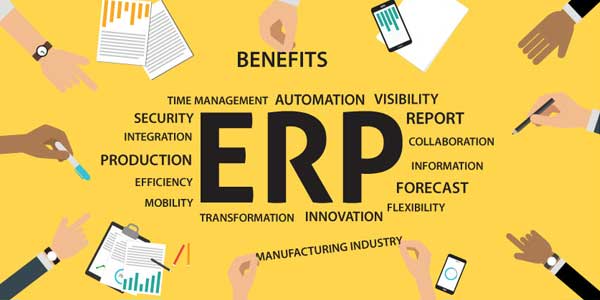
In today’s business world, companies are constantly looking for ways to improve efficiency, streamline processes, and gain a competitive edge. One tool that has become increasingly popular in recent years is Enterprise Resource Planning (ERP) software. ERP software integrates and automates various business functions, including finance, human resources, supply chain management, inventory management, and customer relationship management.
Enterprise Resource Planning (ERP) software has become an essential tool for modern manufacturing businesses. ERP software integrates and automates various business functions, including finance, human resources, supply chain management, inventory management, and customer relationship management. In this article, we’ll discuss how helpful ERP software is for manufacturing and why more and more manufacturers are adopting it.
Table of Contents
Improved Production Planning And Scheduling:
ERP software can help manufacturing businesses improve their production planning and scheduling by providing real-time data on inventory levels, production capacity, and demand. This means that businesses can quickly identify production bottlenecks and adjust their production schedule to meet customer demands. Additionally, ERP software can help businesses optimize their production process by identifying opportunities to reduce waste and improve efficiency.
Better Inventory Management:
ERP software can help manufacturing businesses manage their inventory more effectively by providing real-time inventory data and automating inventory processes. This means that businesses can quickly identify inventory shortages and order more stock as needed, reducing the risk of stockouts and lost sales. Additionally, ERP software can help businesses optimize their inventory levels, reducing the amount of excess inventory they hold and improving their bottom line.
Improved Quality Control:
ERP software can help manufacturing businesses improve their quality control processes by providing real-time data on product defects and quality issues. This means that businesses can quickly identify quality issues and take corrective action to prevent future defects. Additionally, ERP software can help businesses track and analyze quality data over time, allowing them to identify trends and make informed decisions about process improvements.

Improved Visibility And Collaboration:
ERP software provides businesses with a single source of truth by integrating all business functions into a single system. This means that employees can access accurate and up-to-date information about customers, orders, inventory levels, and financial data in real time. This improves collaboration between departments and makes it easier for teams to work together towards a common goal. For example, the sales team can access inventory levels in real time and adjust their sales strategy accordingly, while the procurement team can use the same data to order more stock as needed.
Better Supply Chain Management:
ERP software can help manufacturing businesses manage their supply chain more effectively by providing real-time data on supplier performance, inventory levels, and demand. This means that businesses can quickly identify supply chain disruptions and take corrective action to minimize their impact. Additionally, ERP software can help businesses optimize their supply chain by identifying opportunities to reduce costs, improve efficiency, and increase collaboration with suppliers.
Increased Efficiency And Productivity:
ERP software can help manufacturing businesses increase their efficiency and productivity by automating many manual and time-consuming tasks, such as data entry, inventory management, and financial reporting. This frees up employees’ time to focus on more important tasks, such as product development and customer service. Additionally, ERP software can help businesses identify inefficiencies and bottlenecks in their processes, allowing them to optimize their operations and increase productivity.
Improved Financial Management
ERP software can help manufacturing businesses manage their finances more effectively by providing real-time financial data and automating financial processes. This means that businesses can quickly identify financial trends and make informed decisions about investments and cost-saving measures. Additionally, ERP software can help businesses manage their cash flow, reduce financial risk, and comply with financial regulations.
Better Customer Service:
ERP software can help manufacturing businesses provide better customer service by giving employees access to customer information in real time. This means that employees can quickly and easily answer customer inquiries and resolve issues. Additionally, ERP software can help businesses track customer orders and preferences, allowing them to provide personalized service and improve customer loyalty.
Increased Data Security:
ERP software can help manufacturing businesses increase data security by centralizing and securing sensitive business data. This means that businesses can control who has access to sensitive data and ensure that it is protected from unauthorized access. Additionally, ERP software can help businesses comply with data protection regulations and reduce the risk of data breaches.
In conclusion, ERP software can be incredibly helpful for businesses of all sizes and industries. By improving visibility and collaboration, increasing efficiency and productivity, providing better customer service, improving financial management, better inventory management, improving supply chain management, and increasing data security, ERP software can help businesses optimize their operations and gain a competitive edge. With the many benefits of ERP software, it is no surprise that more and more businesses are adopting it.

 About the Author:
About the Author:
















Be the first to write a comment.